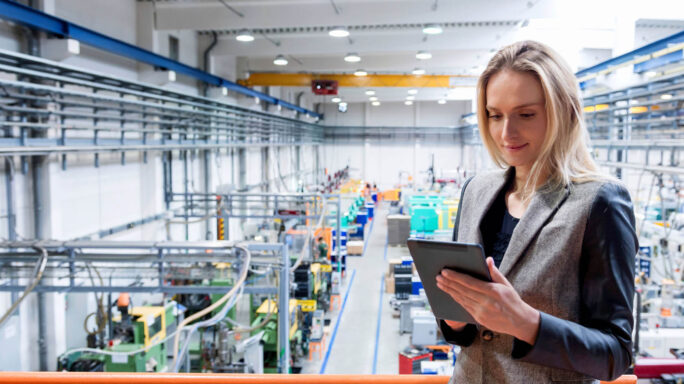Process manufacturers and digital transformation – the quest for enhanced intelligence and agility

COVID-19 created a challenging new business context for process manufacturers almost overnight. There was no time to steadily acclimate to their customers’ sudden and fast-changing demands. Nor could they slowly get to grips with the increasing complexity of diverse product inventories and supply chain fluctuations.
In times of disruption, resilience is key to success, but legacy tech stands in the way of digital transformation and prevents process manufacturers from managing quality, inefficiency, and the threat of costly recalls and associated reputational repercussions.
Today’s process manufacturers have to be faster, more agile, and more responsive than their competitors or risk becoming yesterday’s brands. What’s more, the range of internal and external challenges they face is compounded by the importance of sustainability: customers and regulators are calling for less environmental impact in all aspects of process manufacturing, from production to delivery.
Key to navigating this strange new world is a customer-centric approach that delivers:
- Improved production efficiencies,
- Smooth supply chain processes and supplier relationships,
- The ability to adapt quickly to changing costs and prices, and
- Clear stock oversight at all times.
In other words, you need 24/7 visibility into your manufacturing processes, suppliers, and customers to avoid errors in supply and demand and keep waste to a minimum.
Modern production systems that use the latest technologies can provide such end-to-end visibility. This is enormously valuable – particularly when dealing with continuous production modes. However, many process manufacturing businesses are straddled with legacy ERP systems and are reluctant to invest in upgrades.
Weighing up the pros and cons
In stormy weather, some stay put and batten down the hatches, reducing expenditure in the hope that what they’ve spent years building holds up.
Others attempt to fight the storm by investing in all sorts of new resources designed to retain existing customers and acquire new ones. It is only logical to try and protect your business – and the past 18 months have revealed a number of different responses from many different companies. Regardless of your approach, as the dust from the pandemic somewhat settles, you need to ask yourself if your organisation is digitally prepared for the uncertainty that lies ahead.
The problem with sticking with your current ERP system is that it might not be able to give you the information you need when you need it. That said, you have very likely heavily invested in your existing tech infrastructure and are loath to embark on yet another digital transformation.
Implementing new technologies can be a challenging – and costly – endeavour if not managed properly. However, when the implementation process is careful and strategic, there is a positive impact on both revenue and profit.
Strategize and digitise
There is a rising digital divide in the manufacturing sector. Some companies have already successfully transitioned from an outdated ERP system to an intelligent ERP one, while others have yet to step forward. If your business is one of the latter, there is a clear case for conducting a digital maturity assessment before designing your digital transformation strategy.
Essentially, this involves reviewing your existing technological infrastructure and identifying how and where it works – and also, where it falls short. Crucial to this process is assessing your people’s level of digital skills as well as your operation’s functional collaboration. If, for example, your IT function sits in a silo, digital skills might not be embedded throughout the organisation. This creates organisational blind-spots and prevents interdepartmental collaboration.
Your digital transformation strategy needs to be based on your company’s specific needs. With the right intelligent ERP onside, you can digitise successfully and transform your manufacturing processes sustainably, cost-effectively. and competitively.
According to the IDC, those manufacturers that have already made the right digital investments have seen the biggest returns on their marketing, sales, customer experience, strategy, and distribution results. The ability to ‘see’ every part of their business operations at all times, and make decisions based on real-time, actionable information puts them streets ahead.
Reduce errors with data-based action
Intelligent ERP systems make data work harder and deliver better business results. For process manufacturers feeling adrift in a sea of uncertainty, taking control of your data is key to staying afloat.
An iERP system harnesses the power of technologies such as the Internet of Things (IoT), AI, and machine learning for advanced automation. Data is fed through algorithms to reveal insights that are easily accessible by all stakeholders. Armed with visible and accessible information, you can trace key metrics across your value chain such productivity, inventory, booked versus billed, and continuous production versus batch – as well as mitigate any issues like loss of money related to missing payment discounts.
Product traceability and provenance are key to supply chain resilience. Process manufacturers supported by an iERP system can track what happens to a product at each step of the supply chain. Only with the right digital assistance can you track and trace every component of a product and address issues of sustainability, risk, and non-compliance.
An intelligent ERP system is core to transforming your business into an agile entity designed for a post COVID-19 manufacturing world. Now is the time to leverage the capabilities of iERP to keep pace with current challenges as well as to build a sustainable and competitive business that thrives well into the future.
Digital transformation in process manufacturing
How Intelligent ERP can help close the information gap and achieve traceability across the supply chain







Ask the author a question or share your advice